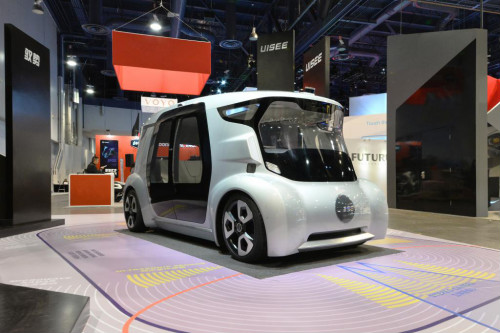AI now driving domestic economy toward digitization

A driverless car made by a Chinese company was showcased at the 2017 International Consumer Electronics Show in the United States.
Artificial intelligence (AI) has been driving the digitization of the Chinese economy, in particularly since March 2017, according to a research report on the role of artificial intelligence in domestic development released on Jan. 19.
To examine the impact of AI on the digitization of the Chinese economy, the School of Economics and Management at Tsinghua University observed the data generated by search engine Baidu over the past four years and analyzed social consciousness, current demand for application and development tendency on the basis of national and regional levels.
The report categorized social consciousness of AI into three stages and respectively explored their current circumstances. In terms of users’ search content, the initial level refers to the most basic and straightforward sentiment presented by search phrases like “artificial intelligence.” The second stage touches upon professional fields, such as terminologies like “deep learning,” while the most fundamental one relates to search terms of technologies and arithmetic like “convolutional neural network.”
It also considers public demand for applying AI to technologies and industries. The measurement of technological application emphasizes public attention paid to research and development in real-world settings, such as deep-learning apps and virtual reality glasses. When measuring industrial application, researchers looked at people’s concerns about how AI is integrated with such sectors as transportation, finance, manufacturing and medical care. For example, internet users may search for phrases like “driverless cars” and “smart investment consultancy.”
Based on the shift of search content in the aforementioned two categories, the research found that social consciousness and demand for practical AI applications reached a new inflectional point in March 2017, marking the arrival of a transformative era in which artificial intelligence began to serve as the engine driving Chinese economy toward digitization. Also, the southern regions of China demonstrated greater AI social consciousness and demand for application relative to northern areas, and the Yangtze River Delta is the most representative area, according to the report.
The report highlighted the 2016 event in which Google’s AlphaGo AI defeated Go world champion Ke Jie. The competition between a machine and a top player attracted global attention, rapidly raising social consciousness of the initial and the second stages in March while the more fundamental consciousness relating to the technology began to quickly increase a year later.
Chen Yubo, director of the Research Center for Internet Development and Management at Tsinghua University, suggested that the difference between this wave of interest in artificial intelligence and the previous two lies in the huge progress made in AI technology and related industrial sectors. And the most pronounced characteristic is the extension of the scope of impact from industry professionals to the general public, he said.
The article was translated from China Youth Daily.
(edited by MA YUHONG)
